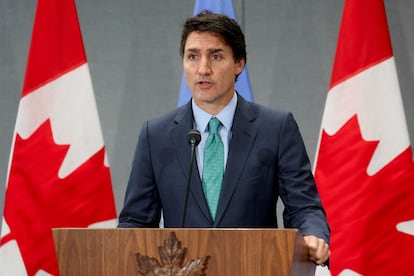Canada says Google will pay $74 million annually to Canadian news industry under new online law
Facebook and Instagram parent company Meta already has been blocking Canadian news since earlier this year

Canada’s government said Wednesday it reached a deal with Google for the company to contribute $100 million Canadian dollars annually to the country’s news industry to comply with a new Canadian law requiring tech companies to pay publishers for their content.
The agreement removes a threat by Google to block the ability to search for Canadian news on Google in Canada. Facebook and Instagram parent company Meta already has been blocking Canadian news since earlier this year.
“Google has agreed to properly support journalists, including local journalism,” Canadian Prime Minister Justin Trudeau said. “Unfortunately Meta continues to completely abdicate any responsibility towards democratic institutions.”
Pascale St-Onge, the minister of Canadian heritage, said that Google will contribute $100 million Canadian ($74 million) — indexed to inflation — in financial support annually for a wide range of news businesses across the country.
“It’s good for the news sector. If there is a better deal struck elsewhere in the world, Canada reserves the right to reopen the regulation,” St-Onge said at a news conference.
“This shows that this legislation works. That it is equitable. And now it’s on Facebook to explain why they are leaving their platform to disinformation and misinformation instead of sustaining our news system,” she said.
Canada in late June passed the Online News Act to require tech giants to pay publishers for linking to or otherwise repurposing their content online. Meta responded to the law by blocking news content in Canada on its platforms. Google’s owner Alphabet previously had said it planned to do the same when the law takes effect in December.
Meta has said the Online News Act “is based on the incorrect premise that Meta benefits unfairly from news content shared on our platforms, when the reverse is true.”
Meta’s change means that people in Canada are not able to view or share news on Facebook and Instagram — including news articles, videos and audio posted by outlets inside or outside of Canada. Links posted by Canadian outlets are still visible in other countries.
St-Onge has called Meta’s move “irresponsible.” “With newsrooms cutting positions or closing entirely, the health of the Canadian news industry has never been more at risk,” she said in Wednesday’s statement.
Kent Walker, president of global affairs at Google and Alphabet, thanked the minister in a statement and said Google would continue sending valuable traffic to Canadian publishers.
Earlier this year, Canada’s government said it would stop advertising on Facebook and Instagram, in response to Meta’s stance.
Meta has taken similar steps in the past. In 2021, it briefly blocked news from its platform in Australia after the country passed legislation that would compel tech companies to pay publishers for using their news stories. It later struck deals with Australian publishers.
Trudeau said the deal is going to resonate around the world as countries deal with the same challenges that Canada’s media landscape is facing.
Sign up for our weekly newsletter to get more English-language news coverage from EL PAÍS USA Edition
Tu suscripción se está usando en otro dispositivo
¿Quieres añadir otro usuario a tu suscripción?
Si continúas leyendo en este dispositivo, no se podrá leer en el otro.
FlechaTu suscripción se está usando en otro dispositivo y solo puedes acceder a EL PAÍS desde un dispositivo a la vez.
Si quieres compartir tu cuenta, cambia tu suscripción a la modalidad Premium, así podrás añadir otro usuario. Cada uno accederá con su propia cuenta de email, lo que os permitirá personalizar vuestra experiencia en EL PAÍS.
¿Tienes una suscripción de empresa? Accede aquí para contratar más cuentas.
En el caso de no saber quién está usando tu cuenta, te recomendamos cambiar tu contraseña aquí.
Si decides continuar compartiendo tu cuenta, este mensaje se mostrará en tu dispositivo y en el de la otra persona que está usando tu cuenta de forma indefinida, afectando a tu experiencia de lectura. Puedes consultar aquí los términos y condiciones de la suscripción digital.








































